Working Papers
For submission of articles or Working Papers to CEsA, please send an email to:
comunicacao@cesa.iseg.ulisboa.pt
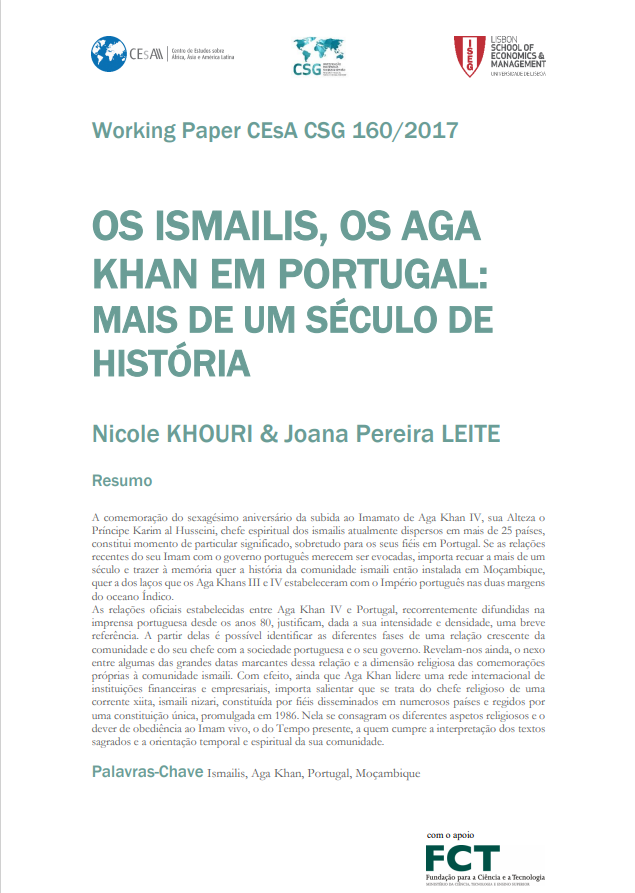
Working Paper 160/2017: Os Ismailis, os Aga Khan em Portugal: mais de um século de história
Abstract:
The commemoration of the sixtieth anniversary of the ascent to the Imamate of Aga Khan IV, His Highness Prince Karim al Husseini, spiritual leader of the Ismailis currently dispersed in more than 25 countries, is a moment of particular significance, especially for his faithful in Portugal. If your Imam’s recent relations with the Portuguese government are worth mentioning, it is important to go back more than a century and recall both the history of the Ismaili community then settled in Mozambique and the ties that the Aga Khans III and IV established with the Portuguese Empire on both sides of the Indian Ocean. In Os Ismailis, os Aga Khan em Portugal: mais de um século de história we study ho the official relations established between the Aga Khan IV and Portugal, recurrently disseminated in the Portuguese press since the 1980s, justify, given their intensity and density, a brief reference. From them it is possible to identify the different phases of a growing relationship between the community and its leader with Portuguese society and its government. They also reveal to us the nexus between some of the great milestones of this relationship and the religious dimension of the commemorations proper to the Ismaili community. Indeed, even though the Aga Khan leads an international network of financial and business institutions, it is important to note that he is the religious head of a Shia current, Ismaili Nizari, made up of believers spread across numerous countries and governed by a single constitution, promulgated in 1986. It enshrines the different religious aspects and the duty of obedience to the living Imam, that of the present time, who is responsible for the interpretation of the sacred texts and the temporal and spiritual orientation of his community.
Quotation:
Khouri, Nicole e Joana Pereira Leite (2017). “Os Ismailis, os Aga Khan em Portugal: mais de um século de história”. Instituto Superior de Economia e Gestão – CEsA/ CSG – Documentos de Trabalho nº 160/2017.
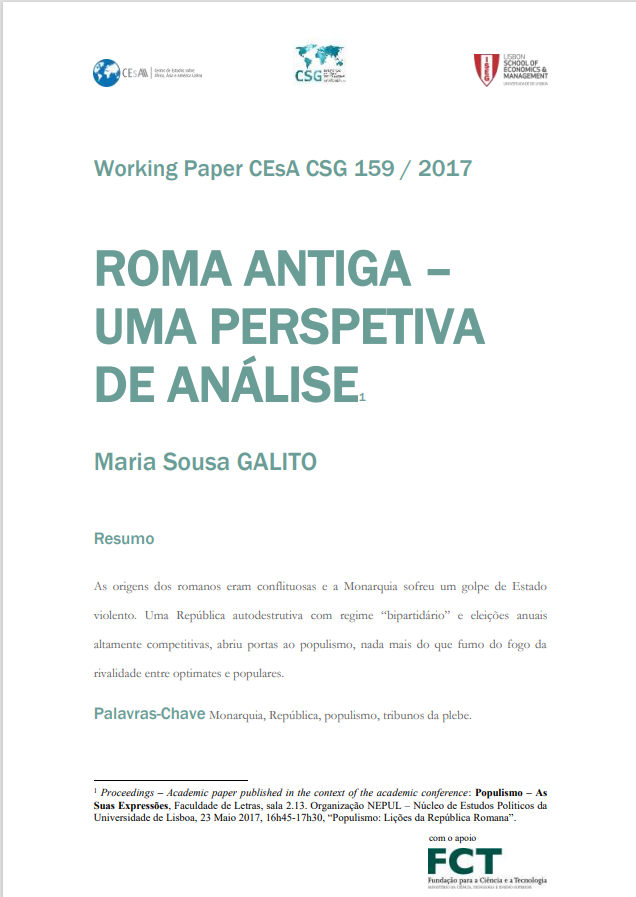
Working Paper 159/2017: Roma antiga: uma perspetiva de análise
Abstract:
The origins of the Romans were conflicted and the Monarchy suffered a violent coup d’état. A self-destructive Republic with two-party rule and highly competitive annual elections opened the door to populism, nothing more than smoke from the fire of rivalry between optimates and populars. Roma antiga: uma perspetiva de análise studies the origins of the Romans, to test the hypothesis that populism was a consequence of a context of fierce rivalry. The first part focuses not only on the people who imposed expansionist policies in their strategic region. It studies the model of integration of neighboring elites into the Roman state and investigates whether the failure of this system may have contributed to the fall of the Monarchy. The second part is complementary and assesses why the Republic ceased to function. It tests the hypothesis that 2nd and 1st century BC Roman society was elitist, oligarchic, and populist, i.e. that it was not only the members of the “party”/popular faction who manipulated the crowds, but also the optimates; and that these divergent views on how Rome should be organized ceased to coexist peacefully, giving rise to civil wars that only ended with the Principate of Augustus.
Quotation:
Galito, Maria Sousa (2017). “Roma antiga: uma perspetiva de análise”. Instituto Superior de Economia e Gestão – CEsA /CSG – Documentos de Trabalho nº 159/2017.
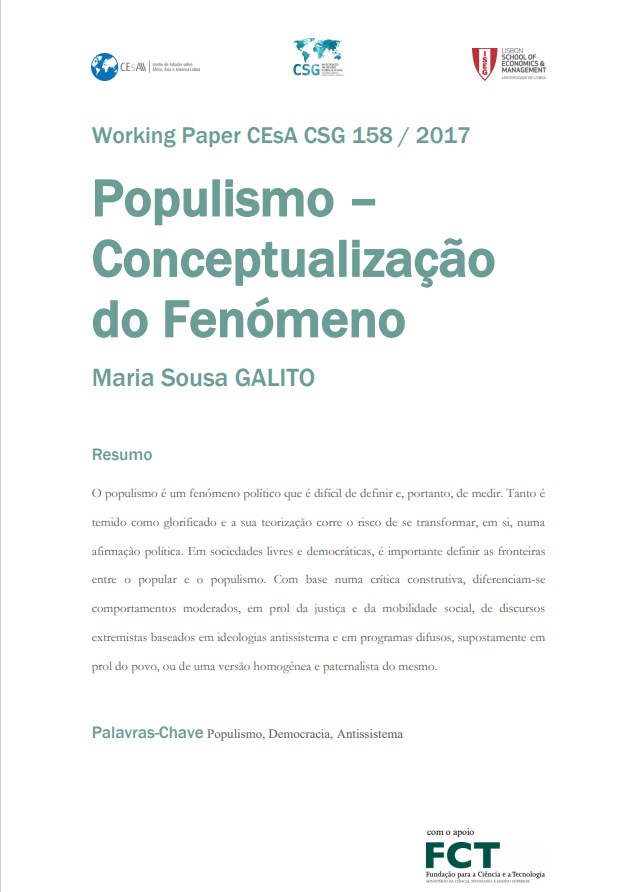
Working Paper 158/2017: Populismo: conceptualização do fenómeno
Abstract:
Populism is a political phenomenon that is difficult to define and, therefore, to measure. It is both feared and glorified, and its theorization risks becoming a political statement in itself. In free and democratic societies, it is important to define the boundaries between popular and populism. On the basis of constructive criticism, moderate behavior, in favor of justice and social mobility, can be distinguished from extremist discourses based on anti-system ideologies and diffuse programs supposedly in favor of the people, or a homogeneous and paternalistic version of them. Populismo: conceptualização do fenómeno is divided into four chapters. The first on the concepts of populism. The second is concerned with the types of populism. The third contextualizes the topic, taking into consideration emotions and the media that project them. The fourth seeks to measure the phenomenon. Therefore, the text seeks to define populism and identifies the lack of consensus around its conceptualization. In an attempt to explain why, it subdivides the various manifestations of it, without forgetting to identify forms of manipulation of the masses, direct or indirect, before proposing ways to measure it and advancing with the main conclusions of the research.
Quotation:
Galito, Maria Sousa (2017). “Populismo: conceptualização do fenómeno”. Instituto Superior de Economia e Gestão – CEsA/ CSG – Documentos de Trabalho nº 158/ 2017.
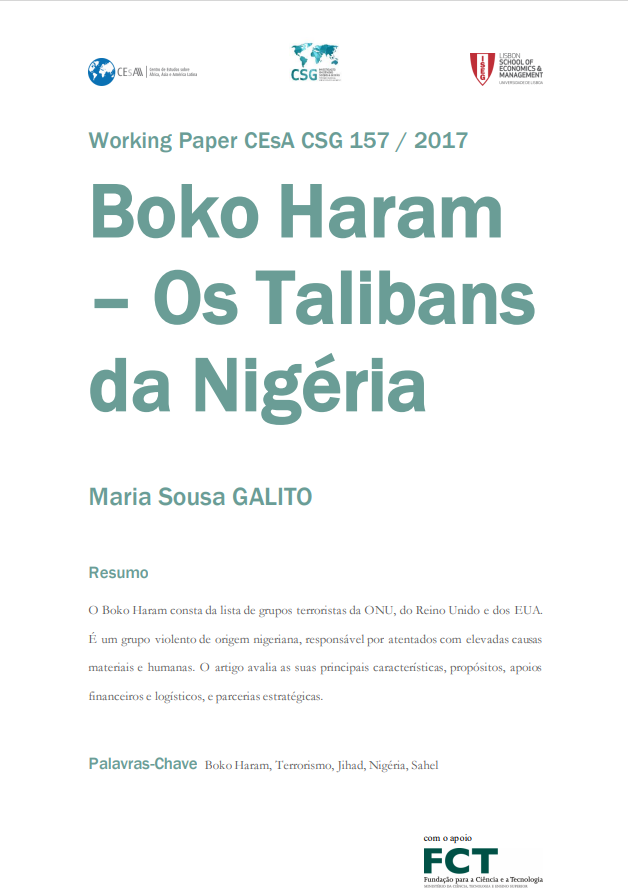
Working Paper 157/2017: Boko Haram – Os talibans da Nigéria
Resumo:
Boko Haram is on the UN, UK, and US list of terrorist groups. It is a violent group of Nigerian origin, responsible for attacks with high material and human toll, officially titled Jama’atul Alhul Sunnah Lidda’wati wal Jihad for “people committed to the propagation of the teachings of the Prophet [Muhammad] and jihad”. Boko Haram – Os Talibans da Nigéria assesses their main characteristics, purposes, financial and logistical support, and strategic partnerships. The research paper focuses its attention on Boko Haram, an internationally known terrorist group that perpetuates regular attacks in Nigeria but also in neighboring countries such as Cameroon. The text is divided into three chapters. The first tries to explain the origins of the phenomenon. The second analyzes the available statistics, relating to different historical periods. The third explains the context in which it operates, in Nigeria and beyond, and the type of partnerships it establishes. The topic is considered to be current and worrisome. Different secondary sources were consulted in order to get an overview of the subject under discussion; since this is a short essay, it was not possible to evaluate the subject exhaustively.
Citação:
Galito, Maria Sousa (2017). “Boko Haram – Os Talibans da Nigéria”. Instituto Superior de Economia e Gestão – CEsA/CSG – Documentos de Trabalho nº 157/2017
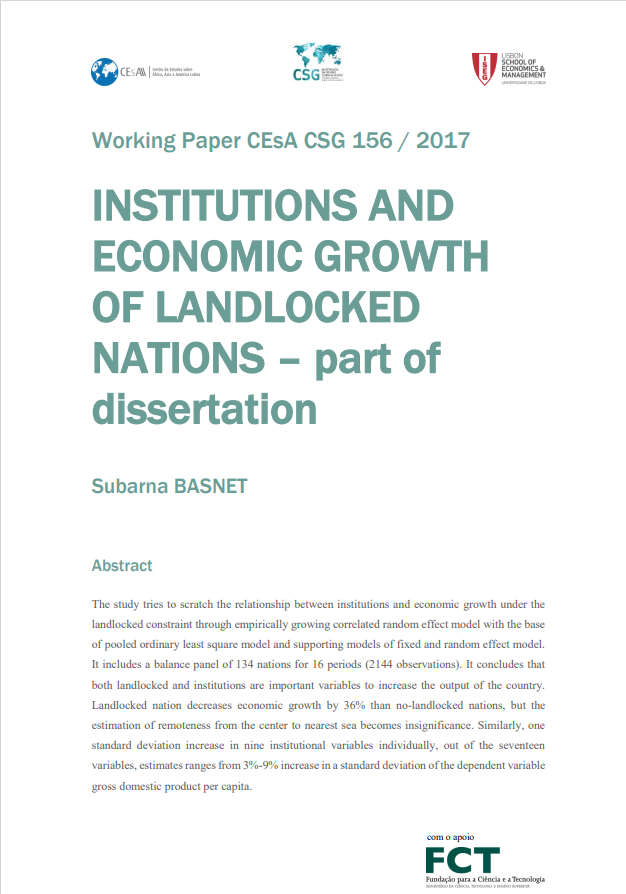
Working Paper 156/2017: Institutions and economic growth of landlocked nations – part of dissertation
Abstract:
Although the impact of economic growth is not absolutely debate-free because of the inequality, economic growth is generally accepted as an economic barometer that indicates the direction of a country’s prosperity. The sustainable higher growth rate over the long periods will have positive multiplier effect throughout the development1 of the country. It will take off from the path of low income country to the middle income country and the middle income to the high income country. Historically, the frontier (USA economy) has raised its per capita income by nearly 17 fold from $ 3000 to more than $ 50000 during the period of 1870 to 2014 (about 150 years) because of an average 2% sustainable economic growth, (Jones 2015). Similarly, Hong Kong, South Korea, Singapore and Taiwan are known as four Asian Dragons from their high growth rates (above an average 7%) between 60’s and 90’s. Japan become world’s second largest economy between 1978-2010 from its post war economic miracle of growth rate 10% in the 1960’s , 5% in the 1970’s and 4% in the 1980’s. In Europe, the republic of Ireland is known as Celtic tiger due to its rapid growth rate (average 5.9%) between years 1995 to 2008. China becomes the second largest country after the year 2010 due to its 30 years of growth rate of average 10% in between 1978-2007. India will be the future economic powerhouse and known as new India due to its continuous higher economic growth rate average 8.2 % from 2006-2011. All these episodes say that the sustainable compounded economic growth makes countries shifting from lower step of development ladder towards the upper steps of development ladder or it helps towards convergence of poor economies to frontier. Interestingly, it is deducing the pace of convergence for the newly growing economies than the past pace of frontier. Institutions and economic growth of landlocked nations – part of dissertation tries to scratch the relationship between institutions and economic growth under the landlocked constraint through empirically growing correlated random effect model with the base of pooled ordinary least square model and supporting models of fixed and random effect model. It includes a balance panel of 134 nations for 16 periods (2144 observations). It concludes that both landlocked and institutions are important variables to increase the output of the country. Landlocked nation decreases economic growth by 36% than no-landlocked nations, but the estimation of remoteness from the center to nearest sea becomes insignificance. Similarly, one standard deviation increase in nine institutional variables individually, out of the seventeen variables, estimates ranges from 3%-9% increase in a standard deviation of the dependent variable gross domestic product per capita.
Quotation:
Basnet, Subarna (2017). “Institutions and economic growth of landlocked nations – part of dissertation”. Instituto Superior de Economia e Gestão – CEsA/ CSG – Documentos de Trabalho nº 156/2017.
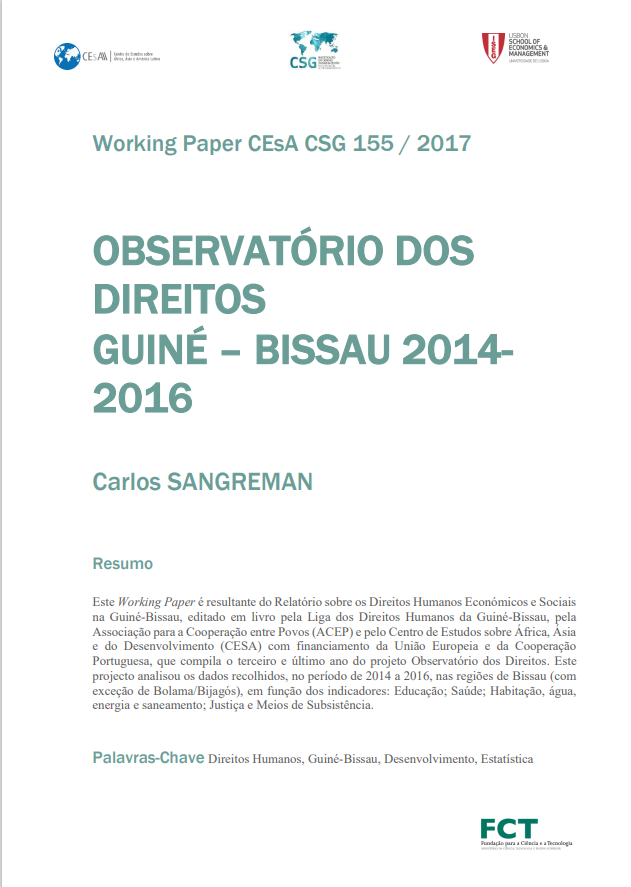
Working Paper 155/2017: Observatório dos direitos Guiné-Bissau 2014-2016
Abstract:
Observatório dos direitos Guiné-Bissau 2014-2016 is the result of the Report on Economic and Social Human Rights in Guinea-Bissau, published in book form by the League of Human Rights of Guinea-Bissau, the Association for Cooperation between Peoples (ACEP) and the Center for African Studies, Asia and Development (CESA) with funding from the European Union and Portuguese Cooperation, which compiles the third and final year of the Observatório dos Direitos project. This project analyzed the data collected, from 2014 to 2016, in the regions of Bissau (with the exception of Bolama/Bijagós), according to the indicators: Education; Health; Housing, water, energy and sanitation; Justice and Livelihoods. This Working Paper is the result of the Report on Economic and Social Human Rights in Guinea-Bissau, published as a book by the Guinea-Bissau Human Rights League, the Association for Cooperation among Peoples between Peoples (ACEP) and the Center for African, Asian and Developmental Studies (CESA) with funding from the financed by the European Union and Portuguese Cooperation. The HD that can be analyzed from the indicators and indicators and the information collected and processed on some aspects of education, health, housing, water energy, sanitation, justice, and means of subsistence (food). You cannot draw from these indicators analysis on aspects that are not included in their calculation.
Quotation:
Sangreman, Carlos (2017). “Observatório dos direitos Guiné-Bissau 2014-2016”. Instituto Superior de Economia e Gestão – CEsA /CSG – Documentos de Trabalho nº 155/2017.
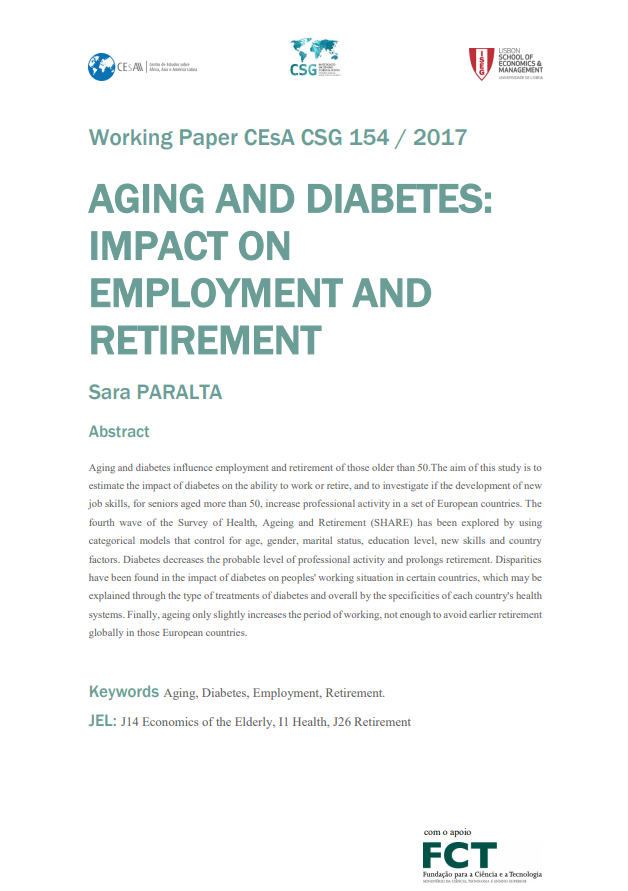
Working Paper 154/2017: Aging and diabetes: impact on employment and retirement
Abstract:
Aging and diabetes influence employment and retirement of those older than 50.The aim of this study is to estimate the impact of diabetes on the ability to work or retire, and to investigate if the development of new job skills, for seniors aged more than 50, increase professional activity in a set of European countries. The fourth wave of the Survey of Health, Ageing and Retirement (SHARE) has been explored by using categorical models that control for age, gender, marital status, education level, new skills and country factors. Diabetes decreases the probable level of professional activity and prolongs retirement. Disparities have been found in the impact of diabetes on peoples’ working situation in certain countries, which may be explained through the type of treatments of diabetes and overall by the specificities of each country’s health systems. Finally, ageing only slightly increases the period of working, not enough to avoid earlier retirement globally in those European countries. The impact of diabetes on professional activity is negative in a set of European Countries included in the inquiry without considering the specific effects of each country. Health problems related with diabetes are causing great economic challenges not only in companies but also in the economy overall. Further investments in education for development new skills and appropriate health treatments of diabetes enhance professional activity. Therefore, those investments are key steps to promote conditions towards active aging and entrepreneurship in senior age.
Quotation:
Paralta, Sara (2017). “Aging and diabetes: impact on employment and retirement”. Instituto Superior de Economia e Gestão – CEsA/ CSG –Documentos de Trabalho nº 154/2017.
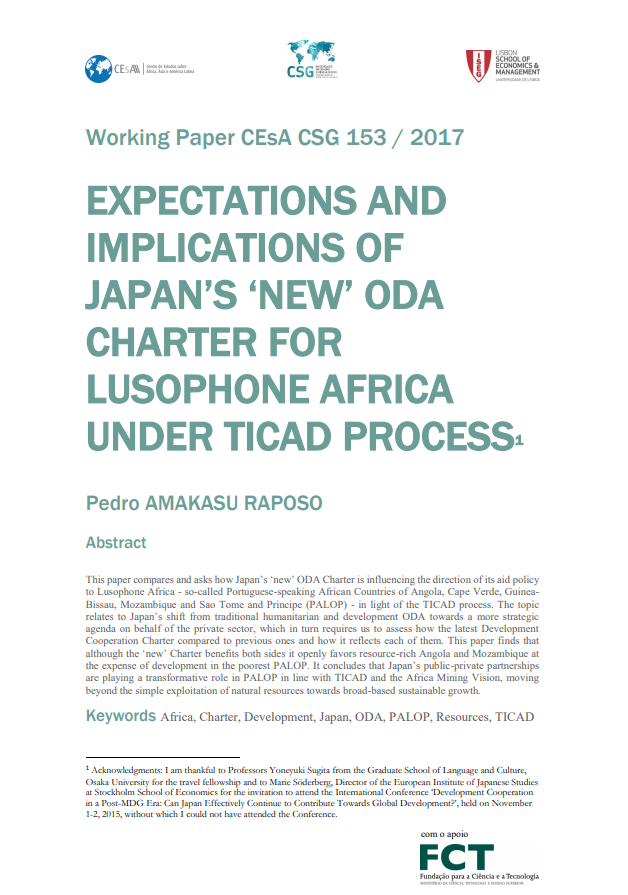
Working Paper 153/2017: Expectations and implications of Japan’s ‘new’ ODA charter for Lusophone Africa under TICAD process
Abstract:
Expectations and implications of Japan’s ‘new’ ODA charter for Lusophone Africa under TICAD process compares and asks how Japan’s ODA Charter is influencing the direction of its aid policy to Lusophone Africa – so-called Portuguese-speaking African Countries of Angola, Cape Verde, Guinea-Bissau, Mozambique and Sao Tome and Principe (PALOP) – in light of the TICAD process. The topic relates to Japan’s shift from traditional humanitarian and development ODA towards a more strategic agenda on behalf of the private sector, which in turn requires us to assess how the latest Development Cooperation Charter compared to previous ones and how it reflects each of them. This paper finds that although the ‘new’ Charter benefits both sides it openly favors resource-rich Angola and Mozambique at the expense of development in the poorest PALOP. It concludes that Japan’s public-private partnerships are playing a transformative role in the PALOP in line with TICAD and the Africa Mining Vision, moving beyond the simple exploitation of natural resources towards broad-based sustainable growth.
Quotation:
Raposo, Pedro Amakasu (2017). “Expectations and implications of Japan’s ‘new’ ODA charter for Lusophone Africa under TICAD process”. Instituto Superior de Economia e Gestão – CEsA (Centro de Estudos sobre África e Desenvolvimento)/CSG Documentos de Trabalho nº 153/2017.
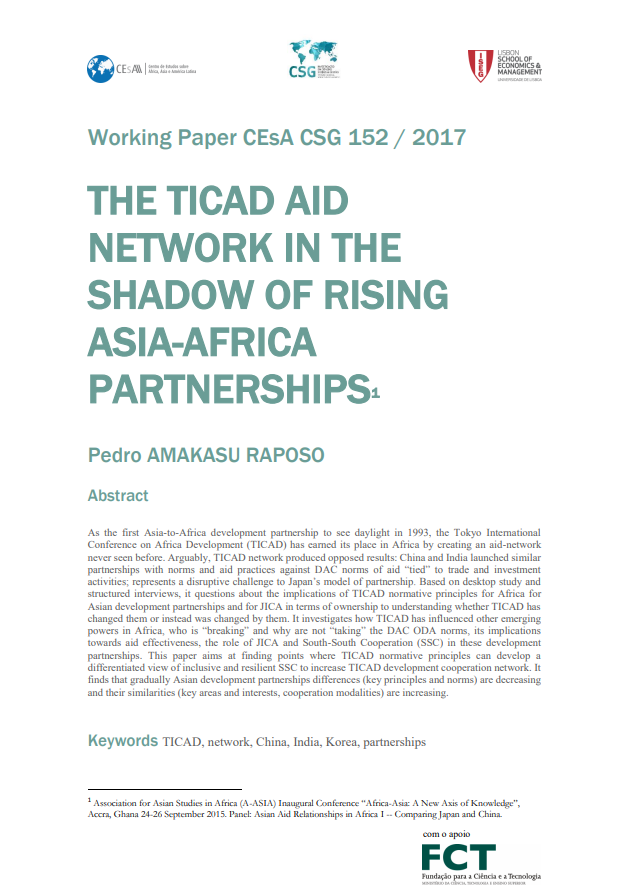
Working Paper 152/2017: The TICAD aid network in the shadow of rising Asia-Africa partnerships
Abstract:
As the first Asia-to-Africa development partnership to see daylight in 1993, the Tokyo International Conference on Africa Development (TICAD) has earned its place in Africa by creating an aid-network never seen before. Arguably, TICAD network produced opposed results: China and India launched similar partnerships with norms and aid practices against DAC norms of aid “tied” to trade and investment activities; represents a disruptive challenge to Japan’s model of partnership. Based on desktop study and structured interviews, it questions about the implications of TICAD normative principles for Africa for Asian development partnerships and for JICA in terms of ownership to understanding whether TICAD has changed them or instead was changed by them. It investigates how TICAD has influenced other emerging powers in Africa, who is “breaking” and why are not “taking” the DAC ODA norms, its implications towards aid effectiveness, the role of JICA and South-South Cooperation (SSC) in these development partnerships. The TICAD aid network in the shadow of rising Asia-Africa partnerships aims at finding points where TICAD normative principles can develop a differentiated view of inclusive and resilient SSC to increase TICAD development cooperation network. It finds that gradually Asian development partnerships differences (key principles and norms) are decreasing and their similarities (key areas and interests, cooperation modalities) are increasing.
Quotation:
Raposo, Pedro Amakasu (2017). “The TICAD aid network in the shadow of rising Asia-Africa partnerships”. Instituto Superior de Economia e Gestão – CEsA/CSG – Documentos de Trabalho nº 152/2017.
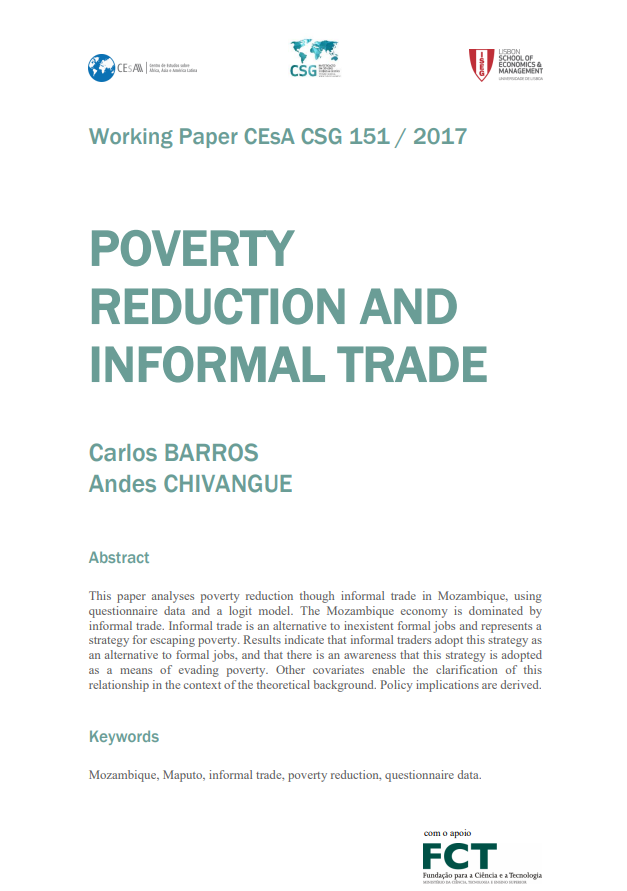
Working Paper 151/2017: Poverty reduction and informal trade
Abstract:
Poverty reduction and informal trade analyzes the relationship between perceptions of poverty and informal trade in Mozambique, based on data from questionnaires conducted in Maputo, the capital of Mozambique, in 2012, adopting a logit model. Research on African poverty is common and generally focuses on microcredit and there is very little emphasis on informal trade, which is so prevalent in Africa. Therefore, this paper contributes to this literature by focusing on informal trade in Mozambique and establishes a relationship between informal trade and perceived poverty. The motivation for this research is threefold. First, although there is a tradition for analyzing poverty in the African context, the relationship between informal trade and poverty perception has not attracted much attention from researchers. This paper thus contributes to the development of the literature and focuses on informal trade in Maputo and also on perceptions of poverty by informal traders. Second, although Lewis’ theory predicts that informal trade workers will later move into the formal sector, this is a long-term issue, and for a specific generation of traders, no transfer is possible due to the low level of education. Therefore, the persistence of informal trade justifies this research. Finally, Mozambique is one of the poorest African countries and no sensible policies against poverty have been adopted, so this informal trade will persist in the future, which is a justification for this research.
Quotation:
Barros, Carlos e Andes Chivangue (2017). “Poverty reduction and informal trade”. Instituto Superior de Economia e Gestão – CEsA/ CSG – Documentos de Trabalho nº 151/2017.





